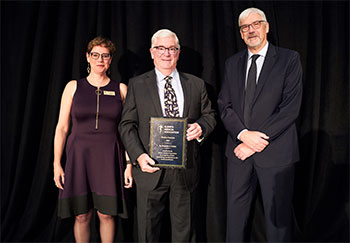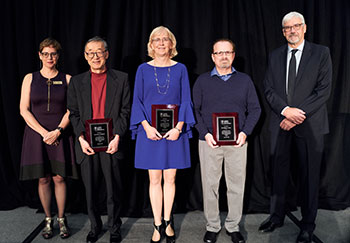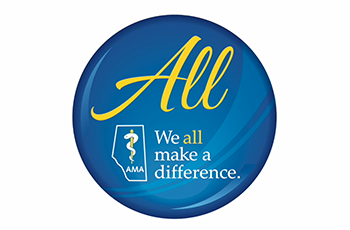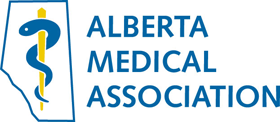AMA Achievement Awards
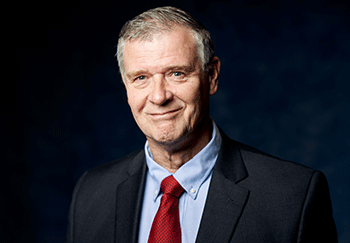
The Alberta Medical Association Board of Directors created the Achievement Awards in 1992 to honour physicians (Medal for Distinguished Service) and non-physicians (Medal of Honour) for their hard work in contributing to quality health care in Alberta.
You or your organization may nominate someone who is working hard to provide quality health care in our province.
Awards
- Physicians may be nominated for a Medal for Distinguished Service.
- Non-physicians may be nominated for a Medal of Honour.
- Physicians may be nominated for a Medal of Excellence and Achievement in Rural/Remote Medicine.
Eligibility
Medal for Distinguished Service
Physician (may or may not be an AMA member) who has made an outstanding personal contribution to the medical profession and to the people of Alberta that has:
- Contributed to the art and science of medicine.
- Raised the standards of medical practice.
- Acceptance of applications is now closed.
Medal of Honour
Non-physician who has made an outstanding personal contribution to the people of Alberta by:
- Contributing to the advancement of medical research, medical education, health care organization, health education and/or health promotion to the public.
- Raising the standards of health care in Alberta.
- Acceptance of applications is now closed.
Medal of Excellence and Achievement in Rural/Remote Medicine
A physician (may or may not be an AMA member) who has made an outstanding personal contribution to patients of rural/remote Alberta and to the rural/remote community(ies) in which they live:
- Residing and providing care in rural/remote Alberta for an extended, not intermittent, period of time.
- Demonstrated commitment to, and engagement in, their community.
- Mentorships/rural teaching to share passion for, and dedication to, the unique specialization of rural/remote medicine.
- Demonstrated recognition by their community of outstanding, news-worthy achievement.
- Download the nomination form for Medal of Excellence and Achievement in Rural/Remote Medicine. The deadline for nominations is August 16.
For more information, contact:
Sarah Zieminek
Public Affairs, Alberta Medical Association
T 780-482-2626
TF 1-800-272-9680
Email sarah.zieminek@albertadoctors.org
Recent recipients
2023
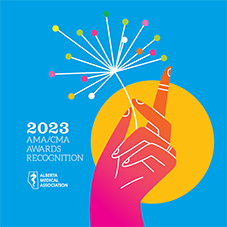 |
Read the 2023 awards booklet |
AMA Medal for Distinguished Service
Dr. Cheryl Mack
Pediatrics, Edmonton
Dr. Cheryl Mack is a pediatric and adult cardiothoracic anesthesiologist with specialised training in pediatric palliative care and complex pain who has studied at the Universities of Manchester, Alberta, Saskatchewan and Regina.
She is a physician, a teacher, a mentor and a researcher of great skill and compassion. But what makes her extraordinary is her commitment to medical ethics and her unending service to the people of Alberta. In the past five years alone, she has served as the Chair of the Ethics Committee for several clinics and hospitals, including the Mazankowski clinic, Kaye clinic, WCM Health Science Center, and Stollery Hospitals (2012–2023), as Medical Lead for the Stollery Hospital (including dispute resolutions 2018–2023), Ethics Lead for University of Alberta Office of Global Surgery (2018–2022), Chair of the Canadian Anaesthesiology Society Ethics committee (2019–2021), Executive member and co-founder of the Canadian Anaesthesia society section for Environmental Sustainability (2018-2020), and Co-chair of the Opioid Poisoning Committee (2021–2022). She also served on the Provincial Practitioner Executive Committee and Council of Zonal Leaders. And she did all this work during very trying times— the COVID-19 pandemic, health care worker shortages, physician burnout, unprecedented patient care gaps and the drug overdose crisis peak.
Dr. Mack’s colleagues refer to her as a physician champion. In her role as chair of the clinical ethics committee, Dr. Mack spent thousands of hours as a physician liaison, supporting the consultation service, doing research and giving presentations to colleagues.
Informally, she was always available to support learners and colleagues facing complex clinical questions or managing moral distress. Early in her career she worked with the Royal College Ethics and Equality Committee and the Caritas Hospitals Ethics Committee and was the Lead for the University of Alberta UGME ethics and law curriculum. In her past role as the Chair of the Canadian Anaesthesiologists Society (CAS) Ethics committee, she helped craft position statements on the peri-operative status of DNR orders and other directives that limit interventions and on the ethical considerations of personal protective equipment (PPE) during scarcity. She teaches with the John Dossetor Health Ethics Centre and the Canadian Bar Association Health Law Section. She is active in citywide rounds, offering an ethics perspective on challenges faced by her colleagues. She has been an ethics presenter and collaborator at many conferences, both nationally and abroad.
And she doesn’t just research ethics; she puts ethics into practice. Dr. Mack has tackled issues such as health care worker burnout, the opioid crisis and staffing shortages, even when doing so posed a risk to her own career. She has supported physician leaders facing unfair termination. She has led workshops to provide naloxone training and worked with students and young offenders. Dr. Mack is a teacher, a mentor and a passionate advocate for both physicians and the citizens we serve. Alberta is very fortunate to have her.
Dr. Jonathan Meddings
Gastroenterology, Calgary
Dr. Meddings received both his undergraduate and medical degrees from the University of Alberta before attending the prestigious GI research training program at the University of Texas, where he acquired skills in clinical gastroenterology and advanced research.
As a researcher, he did important work on Crohn’s disease, gut permeability and malabsorption syndromes in patients with inflammatory bowel disease. He moved into leadership to become head of the GI division and Chief of the Division of the Calgary Health region, where he fostered the development of interactive clinical and basic science programs of gastroenterology into an internationally recognized program known for its research, cohesiveness and quality clinical care. In 2004, he was recruited to the University of Alberta as the Chair of Medicine. In 2009, he became Vice Dean of the Faculty of Medicine at the University of Calgary, and he served as Dean of the School of Medicine from 2012 to 2022.
Dr. Meddings’s lasting legacy will be the positive effect he has had on health care in Alberta. He is a thoughtful, respectful and effective leader, calm in a crisis and open to all points of view. He has championed the concept of precision medicine, an academic approach that puts patients at the centre of research and education, bringing basic science discovery to the bedside and providing big data resources to improve both individual and population level care. As part of this strategy, he established the Centre for Health Informatics at the CSM as a way to collate data for use by faculty and students.
During his deanship, the University of Calgary has moved from tenth to fifth position in the country with respect to research productivity. While there are many reasons for this dramatic growth, about half of the university’s research revenue comes from the medical school, so the processes that Dr. Meddings put into place have played a key role. He has fought for new faculty positions and infrastructure to support the academic mission of the University of Calgary. He is a skilled fundraiser and was an integral player in securing the naming donation of $100M from Mr. Geoff Cumming in 2015. That investment has been leveraged to fund key infrastructure, recruit scientists and establish innovative training programs. All of which are contributing to major, clinically relevant improvements in health and well being, with key
discoveries in the effects of the microbiome, mental health, health care service delivery innovation and entrepreneurial spin-offs.
Dr. Meddings has been a tireless champion for academic medicine in Alberta and nationally. He is an influential voice on provincial committees, advocating tirelessly for efficient use and expansion of AMHSP salary positions, the need for more academic positions to train and retain rural physicians, and other areas of clinical need such as surgery and anesthesia. He has made outstanding contributions to health care as a clinician scientist, educator and academic leader. His work has shaped the health care ecosystem over the
past twenty years and will shape it for years to come.
AMA Medal of Honor
Mr. Bill Kreutzweiser
For more than twenty-five years, Bill Kreutzweiser has worked in executive leadership positions in health care in Canada.
After beginning his career in Ontario, he headed west, first to Vancouver, where he worked with the Vancouver Coastal Health Authority, then to Alberta, where he served as a senior consultant for the AMA from 2012. He has been a trusted advisor to physicians at all levels, enabling many primary care physicians in Alberta to lead through complex situations and changes. He has travelled through all five zones to ensure that physician stakeholders are fully supported in their leadership endeavours, providing coaching, advice and policy-setting guidance.
He has worked tirelessly to gain the trust of primary care physicians, giving them the tools and knowledge they need to build and maintain structures of good governance. Beyond his role in primary care transformation, he has consistently championed the interests of family physicians, advocating for their needs and making sure that their concerns were addressed. His ability to bridge gaps, build relationships and foster a culture of collaboration has allowed him to create meaningful change within the organization and the health care community. If a physician leader within primary care comes to mind for you, there is a good chance that Bill has provided some form of support to that physician.
One of the biggest challenges that Primary Care Networks face in Alberta is the turnover in governance roles on PCN boards. While AMA/ACTT did provide valuable education to boards in the earlier years of PCNs, it became apparent that consistent governance education was required for all board members within all PCNs. Bill played a critical role in developing what is now a highly successful program for governance education and leadership development for PCN board members. He led the development of the AMA Board Competency Training program, which included Essentials, Advanced and Expert Series courses. He created the vision for this training, wrote the content and led the process for securing significant CME credit eligibility for participating physicians. He also delivered this training throughout the province, further demonstrating his commitment to physician leadership. This program is highly valued by PCNs and boards, and it has made an enormous difference in the leadership expertise developed and demonstrated across governance structures in Alberta.
Another important focus of his efforts in Alberta has been the Patient’s Medical Home. Throughout his time at the AMA, he put the PMH at the forefront of his support for physicians and their patients. Starting in 2012, he began providing business and operational support to physicians directly in their family practices. His role then shifted to promotion of the Patient’s Medical Home (PMH) within PCNs, and finally to promoting it to PCN leaders (physicians and non- physicians) in all five Alberta zones. The goal of PMH is to increase patient and provider satisfaction, improve quality of care, reduce cost, improve efficiency and reduce hospitalizations.
Bill has recently been recruited by the Ontario Medical Association and is now the Executive Director for the Section of General and Family Practitioners, working with and on behalf of more than 15,000 family doctors in Ontario. Undoubtedly, he will continue to make the differences in Ontario that he has made here in Alberta.
2022
 |
Read the 2022 awards program |
AMA Medal for Distinguished Service
Dr. James Kellner
Pediatrics / Infectious Diseases / Community Health, Calgary
Dr. James (Jim) Kellner received his medical training in Calgary and Toronto, specializing in pediatrics and infectious diseases. He is currently a clinician researcher at Alberta Children’s Hospital and a professor of pediatrics, Community Health Sciences, and Microbiology, Immunology & Infectious Diseases at the University of Calgary.
At every stage of his career, Dr. Kellner has taken leadership roles, as chief resident of pediatrics at the Hospital for Sick Children and in Calgary as royal college program director for pediatric infectious diseases, section chief of pediatric infectious diseases, associate director, Institute of Maternal and Child Health, and deputy department head for research and administration. His greatest contributions came when he was head of the Department of Pediatrics at the University of Calgary and Calgary Zone of Alberta Health Services from 2008 to 2018. Under Dr. Kellner’s leadership, the department grew dramatically, with the medical and scientific workforce increasing by more than 75%. In addition to his administrative and educational roles, he has maintained both his clinical practice and an active research career.
He has been recognized for his services with numerous honours, including recent awards from the University of Calgary Department of Pediatrics (Advocacy and Leadership Award 2021), Alberta Children’s Hospital Medical Staff (Physician of the Year 2017), Cumming School of Medicine (CME and Professional Development Top Teacher Award 2021), Pediatric Chairs of Canada (Appreciation Award for three years as president 2016 and COVID Leadership Award 2020) and American Academy of Pediatrics (Distinguished Service Award 2019).
Dr. Kellner has made innumerable contributions to pediatrics and infectious disease epidemiology through his career. For twenty years, ten as committee chair, he has been providing expertise and guidance to the province’s vaccine policy as a member of what is now known as the Alberta Advisory Committee on Immunization. His commitment to rigorous evidence reviews, population health considerations and improving the health of Albertans has benefitted us all. During the past two years, working with the COVID-19 Analytics and Strategy Group, the COVID-19 Immunity Task Force (CITF), and the National Immunity Taskforce, his contributions have reached a new level and we have all benefitted from his knowledge of how we could best respond to and control the impact of the pandemic.
To help meet the need for reliable, balanced and scientifically informed information among health professionals and the general public, Dr. Kellner has spoken at more than 60 local, provincial and national video-conferenced COVID-19 education events, and given nearly 200 media interviews. He has remained focused on the health of children by leading efforts to assemble pediatric cohorts and trials across the country related to COVID-19, including vaccination trials, to ensure that the best Canadian science was contributing to the making of evidence-informed and timely decisions to minimize the harms of the pandemic on children. Canadians are fortunate to have such a resolute and expert clinician who gives so generously of his time and energy to ensure that children receive the best care possible.
Dr. Christopher Wilkes
Psychiatry / Pediatrics, Calgary
For more than three decades, Dr. Christopher Wilkes has been a force for change as a clinician and as a leader in advocating for quality mental health supports for children and adolescents.
He received his medical training in England, followed by internships and residencies in England, Scotland and Canada in both pediatrics and psychiatry. He has been practising in Alberta since 1987, first in Lethbridge and then, since 1990, in Calgary, where he has maintained both a clinical practice and an academic position at the University of Calgary. He is currently section chief for outpatients in Child and Adolescent Addiction and Mental Health Community and Specialized Services, Calgary Zone, Alberta Health Services; the University of Calgary/AHS division head of Child and Adolescent Psychiatry and a member of the pediatric and psychiatry faculties; professor of psychiatry and current curricula chair for the PGY-5 and PGY-6 Child and Adolescent Training Residency Program at the University of Calgary.
He has worked tirelessly to advocate for mental health literacy and supports, both provincially and nationally, educating the public about such issues as marijuana and the developing brain, kids in crisis, mood disorders and suicide. During the pandemic, he has worked for child and youth welfare, arguing for the importance of recreational activities for building resilience. He has lobbied hard to reinstate the grant for Regional Collaborative Service Delivery, which gave families access to special education programs including mental health, occupational, physical and speech-language therapists. He has promoted health equity as a member of the Population, Public and Indigenous Health Strategic Clinical Network for AHS since its inception in 2016 and has provided psychiatric consultation for the First Nations settlement in Morley for more than ten years. Even during his sabbatical year in 2011, which he took to recover from metastatic head and neck cancer, he continued working on behalf of Alberta’s young people.
Dr. Wilkes has received numerous awards for his work, including the Professional Association of Interns and Residents in Alberta Award for Teaching; a Certificate of Appreciation for his years of service as a physician examiner with the Medical Council of Canada; the People First Award as part of the Complex Kids Collaborative Team; and the inaugural Friends of Canada Award presented by the mayor of Calgary for bringing the International Association of Child and Adolescent Psychiatry and Allied Professions (IACAPAP) to Calgary. This vital conference brought together multiple disciplines into one location for a unique collaborative opportunity to integrate mental health services. Hence, this was an important vehicle for increasing awareness of child and adolescent mental health, decreasing stigmatism, advocating for local services and research and delivering trauma-informed education.
As Dr. Wilkes transitions to part-time work, this Medal for Distinguished Service recognizes the great debt that the AMA, the medical profession in this province and the people of Alberta owe him for his years of dedicated service and advocacy.
2021
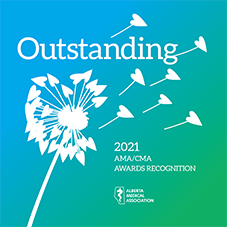 |
Read the 2021 awards program |
AMA Medal for Distinguished Service
Dr. Jane B. Lemaire
Internal Medicine, Calgary
The influence of Dr. Jane Lemaire’s overall work promoting physician wellness cannot be understated.
Physicians suffer distress because of the work that they do, as the pandemic has shown all too clearly. Practising medicine too often comes with an immense cost both to the individual physician’s wellness and to the health care system and patients. It is estimated that burnout costs the health care system $7,000 USD per physician per year, and with over 11,000 Alberta physicians, this amounts to almost $80 million USD. In Dr. Lemaire’s studies, patients reported that when they judge physicians to be burnt out, the doctor-patient relationship is fractured in many ways, including lack of trust, less adherence to suggested medical care, and switching doctors. Burnt-out physicians order more unnecessary tests, have riskier prescribing profiles, and spend less time with patients. Physicians who are well are able to engage in improving the delivery of health care, with widespread benefit.
Well Doc Alberta, a knowledge translation program created by Dr. Lemaire and her colleagues, addresses gaps in the continuum of care for physicians facing occupational distress with education about wellness and interventions to help them lessen distress. As the pandemic has swept over Alberta, Dr. Lemaire and her colleagues, working collaboratively with stakeholder groups, have provided expertise on pandemic planning committees to address the psychological and physical threats to physicians and consultations to many groups concerned about the wellness of their physicians. They have also provided opportunities for education and self-reflection with physician-specific education bulletins, podcasts, and webinars.
Dr. Lemaire has also evolved into a superb medical educator as a result of the knowledge and experience gained from her work with the Royal College of Physicians and Surgeons of Canada, which has enabled her to apply her research findings and disseminate them effectively and broadly. She has worked to develop programs to enhance understanding of this new field of study, to provoke self-reflection about what affects doctors, their profession, and the need for health care systems to change to support physician wellness, and to coach individual physicians and organizations to address the drivers of occupational distress for physicians. Changing attitudes and behaviors and effecting culture change is challenging work, but Dr. Lemaire has worked steadily to meet that task. She has delivered over 450 presentations, responding to invitations from most Canadian faculties of medicine, Stanford University, Hennepin Health care, University of Minnesota, Otago University, and Auckland University, as well as national and international physician wellness conferences.
Her work has earned multiple awards, including the RCPSC International Collaborator Award in 2019, the Stanford Medicine WellMD Center 2018 Physician Well-Being Article Award, and the CMA Physician Misericordia Award for outstanding leadership and support for physician colleagues in 2016. As the pandemic puts ever-greater pressure on physicians and the health care system, her work becomes ever more vital.
Dr. James L. Silvius
Geriatric Medicine, Calgary
When the federal government announced that Medical Assistance in Dying (MAID) would become legal in Canada, Alberta looked to Dr. James Silvius to lead the way. Dr. Silvius brought together the professions, professionals, and regulatory bodies needed to move this new responsibility forward. He worked with families and patients to ensure that their voices were included. In the end, Alberta’s plan was so thoughtful and so well implemented that other provinces in Canada requested Dr. Silvius’s help as they created their own plans to provide MAID, and the federal government asked him to inform their ongoing review of the service. As a result of his work, Alberta is acknowledged as the leader in Canada for MAID policy and service delivery. He continues to lead ongoing work on the development of assisted dying protocols and various associated materials for AHS and as Chair of the Alberta Minister of Health’s Assisted Dying Regulatory Review Committee. He brings a patient-centred and compassionate approach to this difficult but necessary work. Dr. Silvius has ensured that MAID Alberta is a system that delivers lawful assistance in dying to people whose consent is rigorously determined, and in a manner that is compassionate to patients and respectful of health care providers who either wish to assist or who object to the practice. He advises other jurisdictions related to medical assistance in dying, including Health Canada and the State of Victoria, Australia.
Laying the groundwork for this important and demanding work has been more than three decades of deep dedication as a leader and clinician in driving quality health care in Alberta; he has led many beneficial initiatives and programs, including developing the 2014 Palliative and End of Life Care provincial framework, leading the quality agenda for Alberta’s vast and complex continuing care system (over 150,000 Albertans, 35,000 facility spaces, and 25,000 end-of-life recipients), and as a physician expert driving clinical practice changes across the care system in Alberta relating to appropriate prescribing, followed by leading the nation as a founder of the Canadian Deprescribing Network (CaDeN). His leadership in appropriate prescribing has resulted in Alberta leading the nation as related to Appropriate Use of Antipsychotics.
Dr. Silvius’s remarkable contributions have already been recognized by many prestigious awards, including the CMA’s Dr. William Marsden Award for Medical Ethics, the University of Calgary Division of Geriatric Medicine Recognition for Divisional Mentorship, the AMA Long Service Award, and the University of Calgary’s Terry Groves Award for Clinical Excellence and Department of Medicine Innovation Award (for development of the Department of Medicine Telehealth strategy). He has held numerous leadership roles at the hospital, university, provincial, federal, and international levels, as well as maintaining a clinical practice in geriatric medicine and remaining active in research. He is undaunted, it seems, by any challenge, and the people of Alberta have many reasons to be thankful for his dedication and service.
AMA Medal of Honor
Juliet R. Guichon
SJD, Calgary
“Juliet Guichon is a force of nature.” That is, at least, how she has been described by people who’ve worked with her. Dr. Guichon has helped to raise the standards of and increase attention to preventive health care in Alberta by advocating for the good that arises when scientific consensus, based on solid peer-reviewed research, is realized in government policy, practice, and law.
For example, when the HPV vaccine was approved in Canada and recommended by the National Advisory Committee on Immunization in early 2007, she learned from Calgary epidemiologists, pediatricians, and general practitioners that HPV vaccination in Calgary non-Catholic schools was a success, with more than 70% of the girls having received one or more doses, whereas less than 20% of girls attending the Calgary Catholic schools had received the vaccine. She simply could not accept this evidence of disparity; she had to do something. She fought hard to make the vaccine available to everyone who could benefit from it.
Dr. Guichon created a non-profit, nongovernmental organization and started a media and letter campaign against the twelve school districts in Canada that had banned HPV vaccine administration. She started in Calgary, through the organization she created, HPV Calgary. Once Calgary’s school doors opened to the vaccine in 2012, she created a second organization, HPV Canada, to open the doors in nine other Alberta school districts and one district each in Ontario and the Northwest Territories. Her campaigns were fierce; she held media events, she took all media calls, she sent letters to individual board members, she wrote op-ed pieces for major newspapers, she lobbied elected officials and administrators, all with the objective of influencing school board members to vote against the ban. She was oblivious to the roar of hatred from the anti-vaccine activists and to the damaging zealotry from the religious conservatives who favored the ban. By May 2014, all the bans were lifted. This is a magnificent story of citizen activism to improve public health.
She has waged similarly passionate and prolonged campaigns to ban flavors in tobacco products, to reduce nicotine addiction among young Albertans by regulating vaping and e-cigarettes, and to reinstate community water fluoridation in Calgary. In her academic work at the Cumming School of Medicine at the University of Calgary, she teaches courses, conducts research, chairs committees, and mentors students. She has received the Canadian Medical Association Medal of Honour, the Canadian Public Health Association’s National Public Health Hero Award, and the Honorary Membership Award of the Alberta Dental Association and College. She has been invited by the Canadian House of Commons and Senate to testify in public hearings on health matters and has served on not for- profit boards nationally and internationally. As both an academic and an activist, she focuses on issues arising at the intersection of law, health care, ethics, religion, and journalism, working tirelessly to ensure that public policy is based on solid science and focused on improving public health.
Bev Garbutt
Cowley, Alberta
As a Licensed Nurse Practitioner and the wife of a rural family physician, Bev Garbutt recognized the difficulties and the importance of recruiting physicians to rural practice.
She saw that a lack of familiarity with rural life and a lack of training in the needs of rural practice kept many young doctors from considering the possibilities of practising medicine in a rural area. She spearheaded the Rural Enhancement Program to meet some of these needs. Students from rural areas and small communities are more likely to consider returning there after finishing their medical training, so the program offers such students assistance in navigating the educational journey to medical school, including intensive interview training to increase their chances of being admitted. In the past thirteen years, 173 university students from rural communities have participated in the program (with many more who couldn’t attend receiving informal assistance); half of those students have ultimately been admitted to medical school.
In addition, she has organized tours of rural hospitals and scenarios with rural EMS. When students who had taken such tours expressed interest in learning more about rural practice, she called almost every doctor within a hundred kilometer radius of Edmonton and Calgary to request that they take on students for a weekend of job shadowing. The weekend tours included a skills component that over time evolved to a full Skills Day where students could learn how to start IVs, cast fractures, and participate in trauma situations. She was responsible for organizing transportation, accommodation, preceptors, EMS trainers, even suture and casting supplies. After the program was established, the Rural Physician Action Plan took them over, and they continue today under the guidance of RhPAP. Hundreds of students have participated.
She was also instrumental in the development of the Tarrant Scholarship, which provides funds to medical students who have demonstrated an interest in studying and practicing rural medicine. Since its inception, this scholarship has provided over $400,000 to 37 medical students. So important has her contribution to the management and awarding of this scholarship been that some colleagues have suggested she ought to be the one handing it out.
Her commitment to rural medicine is unwavering. As one former student noted, when researching programs in Alberta for rural medical students, more often than not, the contact person was Bev Garbutt. She is tireless in her support for these students, both before they are admitted to medical school and after. When funds for programs in RPAP dried up, she found other sources of funding to make sure programs for medical students from rural areas didn’t disappear. Recently, she has been working to connect with resource and agricultural industries in Alberta to determine if there might be untapped donors for scholarship and bursary funding for rural students in medicine. Her work has enabled many students to move forward in their dream to become physicians and improved access to medical services for many, many rural Albertans.
2020 - Special Commendation
The Committee on Achievement Awards recommended that the AMA confer special recognition in 2020 on specialists in Public Health and Preventive Medicine for their hard work during the COVID-19 pandemic. Their dedication to protect Albertans in such a crisis and under such pressure is remarkable and worthy of our deepest respect. We acknowledge their leadership contributions, not only in the wake of the pandemic, but also in the continuous collaborative efforts to promote health and well-being of Albertans through various public health initiatives, projects and programs.
This specialty area sometimes misses the profile that other specialties enjoy with the public. COVID-19 has brought them to the forefront as our daily guides to health and safety. Alberta’s Chief Medical Officer of Health Dr. Deena Hinshaw and colleagues have been critical to Alberta’s response to the pandemic.
AMA salutes these colleagues for managing the tide of emerging evidence and crafting sound policy under extreme pressure. While COVID-19 grabbed the spotlight for much of 2020, the day to day work, year in and year out, of these specialists makes our province a safer place to live.
